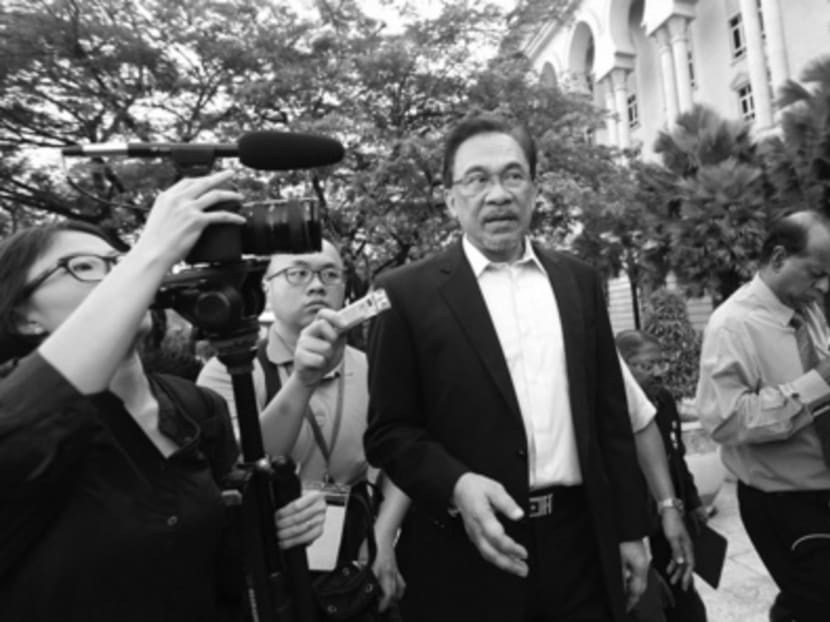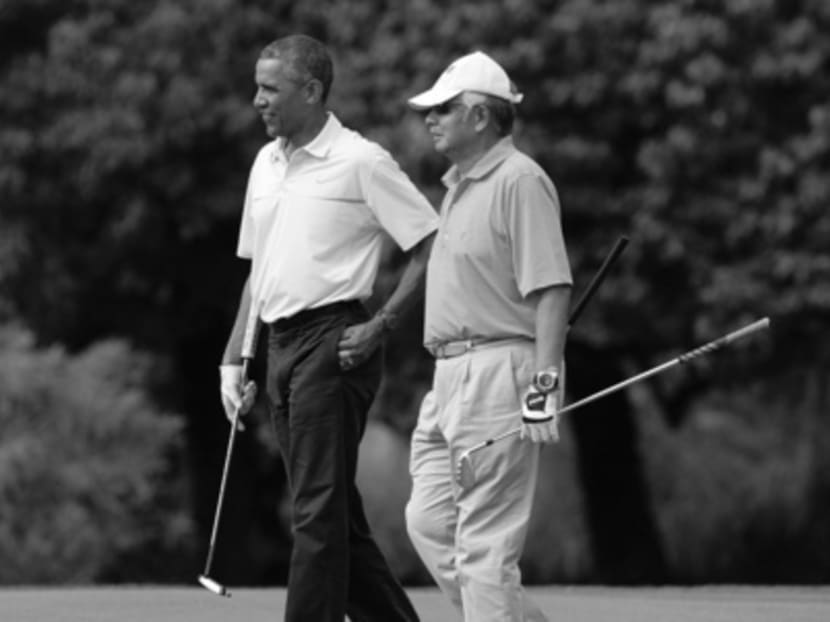Eventful year ahead in Malaysian politics
Finally, after months of a divisive cold war, leaders of the Malaysian opposition Pakatan Rakyat (PR) alliance met over the weekend to pull back from the brink of a break-up. The question is whether this was a serious attempt at patching up, or only a token gesture to paper over, yet again, their differences.


Finally, after months of a divisive cold war, leaders of the Malaysian opposition Pakatan Rakyat (PR) alliance met over the weekend to pull back from the brink of a break-up. The question is whether this was a serious attempt at patching up, or only a token gesture to paper over, yet again, their differences.
Coming just before the Federal Court verdict today on opposition leader Anwar Ibrahim — which could break the opposition alliance for good — Sunday’s meeting has swept their differences under the carpet for now.
The situation is not much better either on the other side of the political divide. Prime Minister Najib Razak seems increasingly buffeted on the political and economic fronts. He now walks under the looming shadows of not one, but three major airplane disasters affecting Malaysian interests in only one year. He is probably the first Malaysian leader since independence to face such unprecedented misfortune while in power. So what lies ahead for Malaysian politics?
THE FATE OF THE OPPOSITION
To begin with, much depends on the outcome of today’s verdict by the Federal Court on Anwar’s appeal against his second conviction of sodomy, which he insists is as politically motivated as the first. More than his political future hangs in the balance. If the apex court quashes his appeal, Anwar will almost certainly be sent to jail and lose his parliamentary seat, potentially triggering two contrasting scenarios.
In the first, the opposition alliance, already deeply fractured between the Pan-Malaysian Islamic Party (PAS) and the secular Democratic Action Party (DAP) despite Anwar’s bridging role, will quickly unravel. In the second, Anwar, the formidable personality that he is, becomes an even greater threat to the Prime Minister from behind bars. Mr Najib cannot afford the opposition icon to become a political martyr at the expense of the ruling Barisan Nasional (BN) coalition.
In fact, Mr Najib could do with Anwar’s support now that the Prime Minister is under attack from two stalwarts, former Premier Mahathir Mohamad and former Finance Minister Daim Zainuddin, for not being firm enough.
In an alternate scenario, Anwar’s appeal is upheld and he escapes jail yet again.
PAS and DAP have long-standing ideological differences papered over largely by the charm and political skill of Anwar. But this already tenuous relationship was badly strained last year when Anwar himself pushed through a controversial change of chief ministership in Selangor state controlled by PR. While both PAS and DAP felt they were not sufficiently consulted on the move, it was PAS that openly refused to go along.
By a strange twist, the tension led to a slugfest instead between PAS and DAP, with the DAP supporting Anwar. The divide has been so bad that it threatened to even split PAS, which has a faction sharing similar thinking with Anwar’s.
In other words, the opposition alliance is under threat of a two-level split — within the Islamist party and within the broader opposition.
While the disintegration of the opposition is just a hair’s breath away, Sunday’s long-delayed meeting of the leadership council was a last-ditch attempt by the three parties’ leaders to reverse the slide. Will they succeed?
TROUBLE WITHIN THE RULING COALITION
For Prime Minister Najib, it was ominous that he was away when the country’s peninsular east coast was hit by a severe flood.
To make matters worse, he was photographed by the American media playing golf with President Barack Obama during a private visit in Hawaii. Mr Najib could have done without this unforeseen problem.
He is already saddled with a number of unpleasant issues since the 2013 general election, when his BN won the polls but lost the popular vote to the Anwar-led opposition. A new state-owned sovereign wealth fund which he advises, 1Malaysia Development Bhd (1MDB), has been heavily criticised for amassing huge debts so soon after being formed.
All this could not have come at a worse time either for the economy: Plummeting global oil prices, which hit Malaysia as an oil exporter, forced the government to revise the national budget.
The gross domestic product growth forecast was correspondingly trimmed to 4.5 to 5.5 per cent, down from 5 to 6 per cent. However, Mr Najib shied away from declaring the economy to be in crisis. “We are neither in a recession nor a crisis (as) experienced in 1997-98,” he said when revising Budget 2015 last month.
The sliding economy, in turn, was adding pressure to the country’s politics: The drop in oil prices was not accompanied by a drop in the prices of goods. It led to one minister controversially blaming “Chinese traders” for profiteering and calling on the majority Malay community to boycott Chinese businesses. There were even alarmist statements of economic sabotage by parties trying to profit from the falling ringgit.
As Mr Najib confronts his critics, he has to ensure that the ruling BN remains stable. But out of the blue, a key partner, the Malaysian Indian Congress (MIC), broke into a very public internal feud over elections for its central working committee, forcing Mr Najib to step in.
United Malays National Organisation (UMNO), as BN’s anchor party, is relatively more stable, but the undercurrents of dissatisfaction with Mr Najib are palpable.
Led by Mr Mahathir, there have also been rumblings within UMNO of moves to ease Mr Najib out as leader, but his deputy Muhyiddin Yassin refused to be a part of this. Instead, Mr Muhyiddin had to deny talk last year that he might step down to focus on helping to run UMNO.
Mr Najib cannot afford a nasty trajectory, especially with 2015 being a year when Malaysia comes under the spotlight as chair of the Association of South-east Asian Nations. He needs to steer the ship of state through the stormy weather ahead. What political skill will he display to ensure his survival as leader?
All in all, the road ahead could be either marked by conflict or political survival through wily compromises.
Regardless, Mr Najib has to ensure that the economy — even though it might slow down somewhat — displays some resilience, while keeping the strategic goal of becoming a developed economy by 2020 on track.
ABOUT THE AUTHOR:
Yang Razali Kassim is a senior fellow with the S Rajaratnam School of International Studies at Nanyang Technological University.






